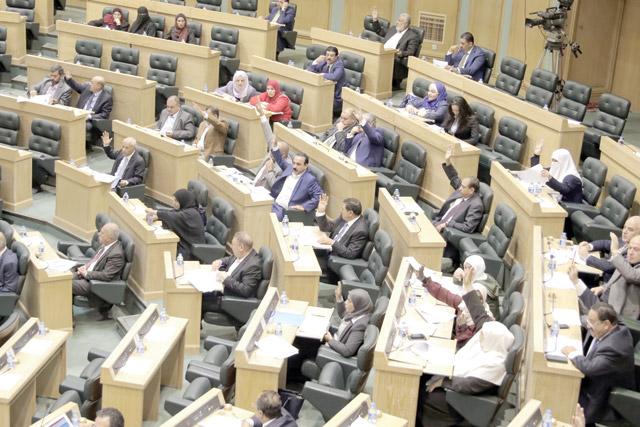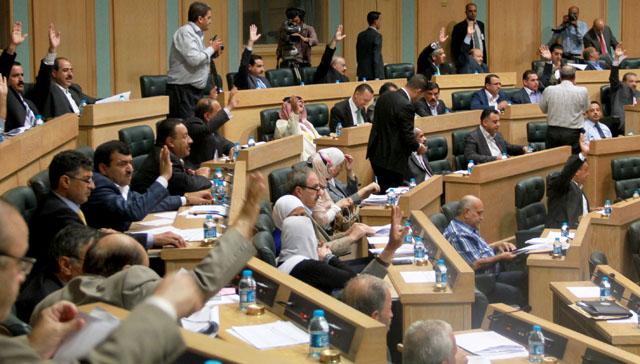You are here
House passes amendments to Independence of Judiciary Law
By Jassar Al Tahat - Jul 24,2017 - Last updated at Jul 24,2017

MPs vote as they deliberate amendments to the Independence of Judiciary Law on Sunday (Photo by Osama Aqarbeh)
AMMAN — Lawmakers on Sunday approved amendments to Independence of Judiciary Law, ensuring the Judicial Council an independent budget and lowering the retirement age for judges.
During a House meeting, MPs debated changes suggested by the Legal Committee to the law, which, according to Minister of Justice Awad Mashagbeh are prone to “better serve justice and widen parliamentary oversight on the judiciary system”.
In its third article, the amended law stipulates that the Judicial Council’s budget would be a fixture in the state budget presented to the Lower House every year.
The Judicial Council, the top judicial authority in charge of running the court system, will be composed of a president [appointed by the King], the president of the Supreme Administrative Court (vice president), chief prosecutor at the Court of Cassation, a judge from the Court of Cassation, presidents of the courts of appeal, secretary general of the Ministry of Justice, president of Amman-based Court of First Instance and two heads of courts of first instance from governorates other than the capital.
MP Saleh Armouti (Amman, 3rd District) pointed out to the absence of the inspector-general from the Judicial Council’s board, urging adding the official to the list due to the significance of this job to the council, as the inspector is “the most knowledgeable when it comes to what goes wrong in the judicial system”.
Under the new changes, the president of the Supreme Administrative Court and the Public Prosecution Department are required to submit annual reports that will be incorporated in an annual report compiled by the Judicial Council and submitted to His Majesty the King.
MP Yihya Saud (Amman, 2nd District) called for “providing judges with all benefits possible to improve their livelihoods”.
The deputies recommended that the government include sitting and retired judges and their dependents under the provisions of Article 26 of the Health Insurance Law, which allows certain categories of public servants to receive treatment at hospitals and clinics not affiliated with the Ministry of Health, including private medical facilities, as part of their health insurance.
Lawmakers also approved a provision that sets the retirement age of top-category judge at 70, instead of 74 in the original law, with the exception of both the president of the Judicial Council and his/her deputy, while the retirement age of the other was set at 65, down from 68.
Convicted soldier case
The issue of Private Maarek Sami Tawayha, who was convicted last week of killing three US Special Forces instructors in Jafer, Maan, in November 2016 and sentenced by a military court to a life sentence, was raised during Sunday’s House meeting.
The sentence sparked rage within his tribe [Huwaitat] who on Friday held a council to discuss the life sentence handed down to their fellow tribesman.
The tribe and its supporters claimed that the verdict was “politically-driven” and called for Tawayha’s release and reinstatement in the army.
MPs Saddah Habashneh (Karak) and Khalil Atiyeh (Amman, 1st District) said the soldier deserved a “fair trial” and called on authorities to “immediately go into dialogue with the Huwaitat tribe”.
Deputy Habashneh held the government “fully responsible for sparking protests in the aftermath of the trial and the escalation that followed”.
Habashneh pleaded with Lower House Speaker Atef Tarawneh to hold a joint meeting outside the Dome with the government to thoroughly discuss and act on the issue.
Tarawneh adjourned the session till Tuesday, when lawmakers are scheduled to hold two sessions to discuss the amended Penal Code.
Related Articles
AMMAN — Lawmakers on Sunday approved amendments to Independence of Judiciary Law, ensuring the Judicial Council an independent budget
AMMAN — Lawmakers on Sunday approved amendments to Independence of Judiciary Law, ensuring the Judicial Council an independent budget
Some MPs on Sunday called for new constitutional amendments to grant His Majesty King Abdullah exclusive authority to appoint the head of the Higher Judicial Council.













